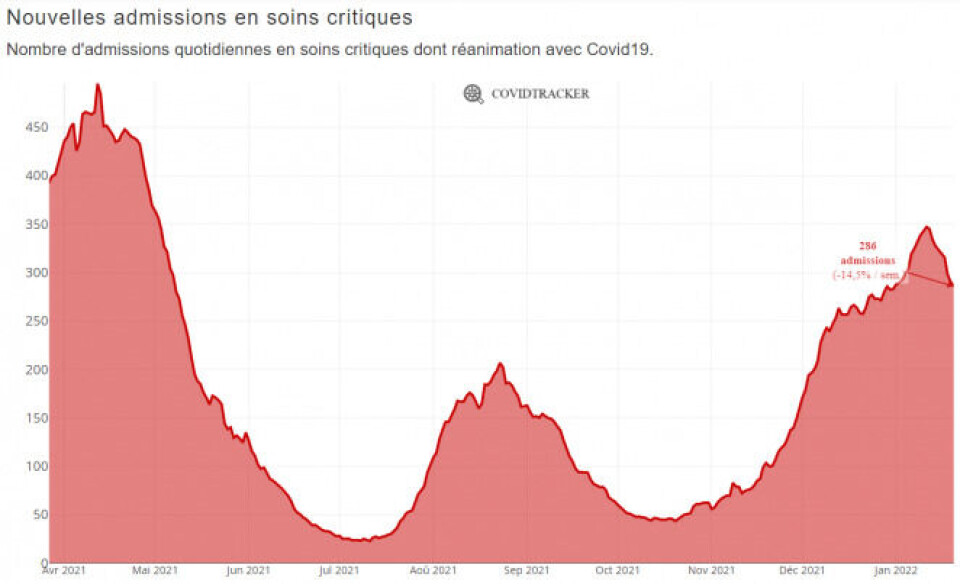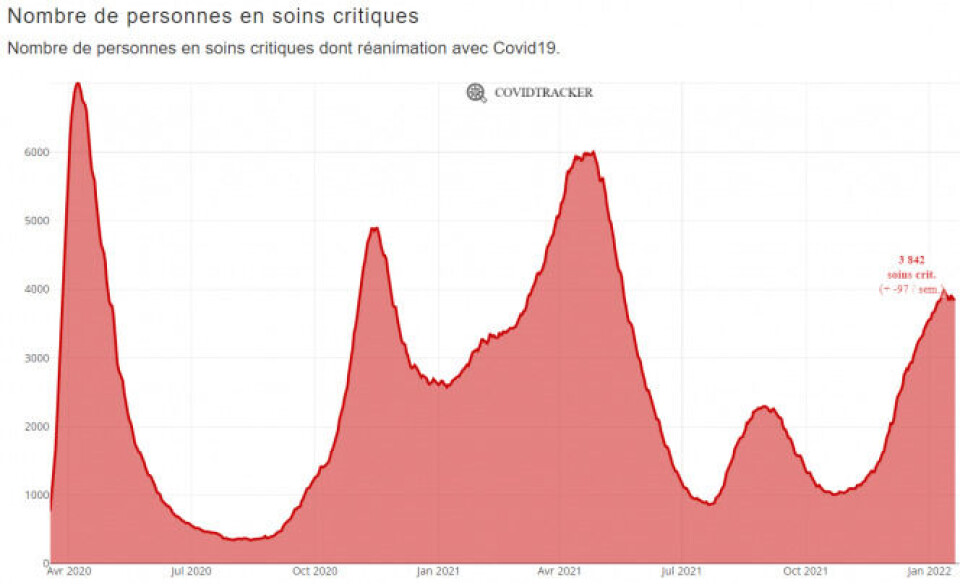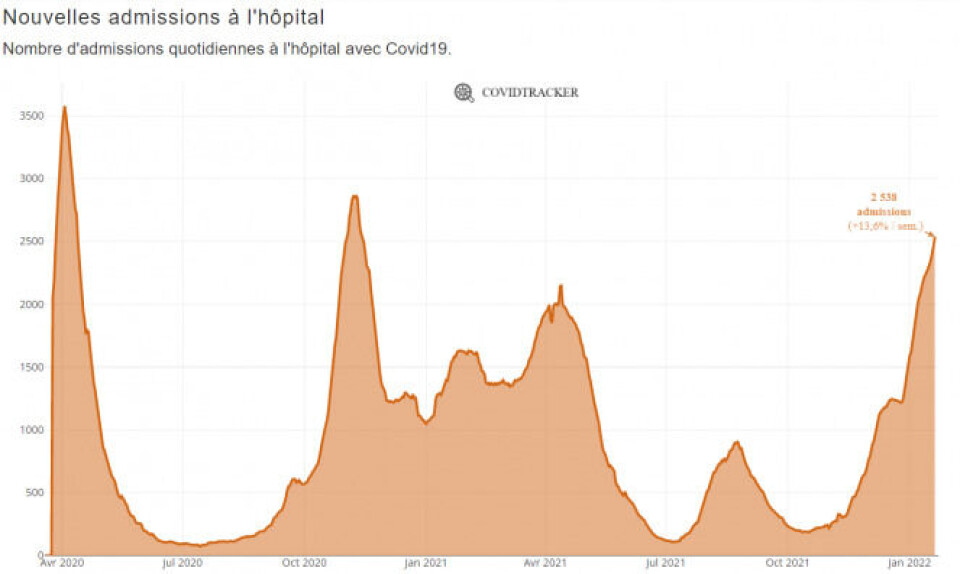-
How many Americans live in Paris - and where else are they choosing in France?
Over a quarter of all US nationals in France live in the capital city
-
Price rises for Netflix in France
The Standard (with ads) and Premium packages are increasing by €24 a year
-
Leclerc supermarkets to sell car fuel at cost price for Easter
The initiative will apply to diesel, petrol, and LPG
Why is France easing Covid restrictions when cases are at record high?
Announcement to lift several measures comes as over 425,000 Covid cases were reported between in the 24 hours between Wednesday and Thursday this week

Prime Minister Jean Castex announced last night (January 20) an easing of Covid measures in two stages in February, lifting rules such as the ban on standing concerts and the obligatory wearing of masks in outdoor areas.
Read more:The five dates in France’s new plan to ease Covid rules
Read more: France to begin lifting Covid restrictions in February: The key points
It comes as the number of daily reported Covid cases continues to break records.
Yesterday (January 20) it was confirmed that 425,183 positive cases had been reported over the previous 24 hours, an increase of 39% from the week before.
Mr Castex said himself last night that already five million people in France had contracted the Omicron variant of Covid, admitting that this figure is likely to be double when including asymptomatic people who caught it and did not take a test.
However, he said that while France had been “hit for almost two months by a wave of exceptional proportions” - due to subsequent waves of Delta and Omicron - the situation is “beginning to change for the better”.
We look at factors which could have influenced the government’s decision to ease restrictions despite the high number of cases.
425 183 cas positifs ont été publiés aujourd’hui, soit une hausse de 39% par rapport à jeudi dernier.
— GRZ (@GuillaumeRozier) January 20, 2022
Moyenne quotidienne : 337 192 cas, +15%. pic.twitter.com/OP5LrgBjEY
The vaccine pass
France is simultaneously easing restrictions and also tightening them, at least for unvaccinated people.
A Covid vaccine will be introduced on Monday (January 24), subject to approval from the constitutional court later today.
Read more here about how the vaccine pass will work and who it will apply to: France to bring in vaccine passes: What will change and when?
Mr Castex said that it was due to the vaccine pass that the majority of restrictions can be lifted in February.
“A fully vaccinated person is 4.5 times less likely to catch Covid and, above all, 25 times less likely to be hospitalised in intensive care units than an unvaccinated person,” he claimed.
Only 7% of adults in France are now unvaccinated, Mr Castex said, adding that they represent the overwhelming majority of patients admitted to ICUs.
Between December 6 and January 2, unvaccinated people represented 58% of patients in ICUs due to Covid, French newspaper Libération found in a fact-checking article published January 16.
While this number does not represent an “overwhelming majority” as Mr Castex claimed, it is still significant given that 93% of adults in France are vaccinated, meaning there are, approximately, 48 million vaccinated adults in France and fewer than five million unvaccinated.
Delta disappearing / ICU admittances falling
Mr Castex spoke of three encouraging signs for France regarding the pandemic, with the first being the fact that cases of the Delta variant are in sharp decline.
“This is very important because…the Delta variant is more dangerous than [other] variants,” he said.
He noted that the number of admittances to ICUs has been dropping in recent days. It has fallen by 14.5% in the past week, figures from government-recognised website Covidtracker.fr show.

Mr Castex said that this drop off should continue as the number of Delta cases decreases.
Omicron subsiding in the UK and around Paris
The second encouraging sign that the prime minister spoke of is the fact that the number of Omicron cases appears to be dropping in the places where it first appeared in France, notably the Ile-de-France region.
“Of course, what we are seeing in Ile-de-France is not yet true in most other metropolitan regions, where the Omicron variant arrived later and where the number of cases continues to rise.
“But this different evolution according to the territories is classic and so what is happening in Ile-de-France is reassuring.
“Above all, it is consistent with what we see in the UK, where the Greater London region experienced its peak 10 days before the rest of the country,” he said.
UK Covid case numbers have fallen rapidly in the past week or so.
British epidemiologist professor Tim Spector said that “Omicron cases are disappearing fast all over the UK”, except in the North East, and that the situation was looking good.
Zoe shows Omicron cases disappearing fast all over the U.K. except NEast - down from peak of 208000 to 155000 per day so still high but looking good 😊 pic.twitter.com/H555b573bi
— Tim Spector MD (Prof) (@timspector) January 16, 2022
The UK is to drop Covid rules such as wearing masks in public places and the use of health passes from next Thursday.
There is as yet little explanation for why Covid cases in the UK have dropped off so quickly, with high levels of immunity from vaccines and infections one possible theory. Another being that people have been behaving more cautiously.
The French government appears to be banking on the Omicron wave in France following a similar trend to the UK, expecting it to subside in the next few weeks.
Health Minister Olivier Véran cited the UK example when explaining why France will relax measures in two steps on February 2 and 16.
“February 2 because that will be one week since the vaccine pass is in place,” he said.
“The 16th, because we consider that around mid-February we should have passed the peak of the Omicron wave.
“Observing the situation in the UK and the Ile-de-France, we should see a drop off in cases in the rest of the country by then,” he said.
This prediction goes against what France’s Covid scientific council, the conseil scientifique, stated in a report updated yesterday (January 20).
They have said that the Omicron wave is “not yet over” and its “impact on the health system will continue until mid-March”.
Omicron dangerous, but less severe
Mr Castex said the third reassuring sign is, finally, the confirmation that Omicron is certainly more contagious than other variants, but clearly less severe.
However, he warned that the Omicron variant was dangerous.
“Even when weakened, this virus is not a harmless one. It is definitely not a simple flu,” he said.
“In a normal year, the flu epidemic causes an average of 10,000 hospital admissions over the winter period. With Omicron, we reached this figure not in three months, but in five days.”
Case numbers not the only important factor
Mr Castex’s comments about Omicron being less severe seem to indicate that the government is looking more closely at factors other than case rates when deciding on Covid measures.
As stated above, the number of admittances to ICUs has dropped 14.5% in the past week.
Additionally, the total number of patients in ICUs has never reached anywhere near the same peaks seen during previous waves of Covid in spring 2020 or 2021.
The graph below shows the total number of people in ICUs in France due to Covid from April 2020 to today.

However, while this element is promising, the number of admittances to hospitals continues to increase.
There are now nearly 28,000 people in hospital for Covid reasons in France, with the latest figures showing just over 3,000 admittances in the past 24 hours. This total figure is up from just over 24,000 patients one week ago.
The number of admittances to hospitals has not reached record levels during this wave, but the rate is continuing to rise and is approaching figures not seen since November 2020.
The graph below shows the hospital admittances rates from April 2020 to today.

Will a new Omicron sub-variant stop case rates falling?
A French scientist has warned that a new variant of the Covid Omicron virus, dubbed “BA.2,” could cause a new wave of the epidemic in France, just as the government is banking on the peak of infections passing.
Professor Antoine Flahault, epidemiologist at the Institut Pasteur and a member of government advisory body le Conseil scientifique, has said that “BA.2” could cause a “rebound” spread across the country.
He also said that the new variant could be the reason that cases in France are not falling as quickly as expected.
“In the UK, the number of new Covid-19 cases is halving every seven days. We expected France to follow the UK's lead, with a two-week delay: this is not the case,” he told CNews yesterday (January 20).
Read more:Leading French scientist: variant of Omicron may cause new Covid wave
In Denmark, which is doing a lot of sequencing - a technique that makes it possible to analyse the entire genome of a positive Covid sample - BA.2 has become the dominant strain, which could indicate that it is highly contagious.
"The speed with which it spread in Denmark suggests that it may be more contagious than Omicron," Professor Flahault said.
"Denmark was not very far from reaching the peak of the Omicron wave, but the case rates are rising again with the predominance of this new sub-variant.”
French health minister Mr Véran acknowledged yesterday evening the fact that the BA.2 sub-variant has been identified in France.
However, he said that it is not a “game changer”.
The World Health Organisation has not classified it as a variant of interest, he noted, adding, “at least not at this stage”.
“As far as we know, it more or less matches the characteristics we know about Omicron," he said.
“It is part of a subgroup of Omicron and is not a game changer. At this stage, there is no knowledge of any risk of contagiousness to those who have already contracted Omicron.”
Related articles
Coronavirus: Daily updates on the situation in France
New virus tracking tool estimates Covid contact risks in France
























